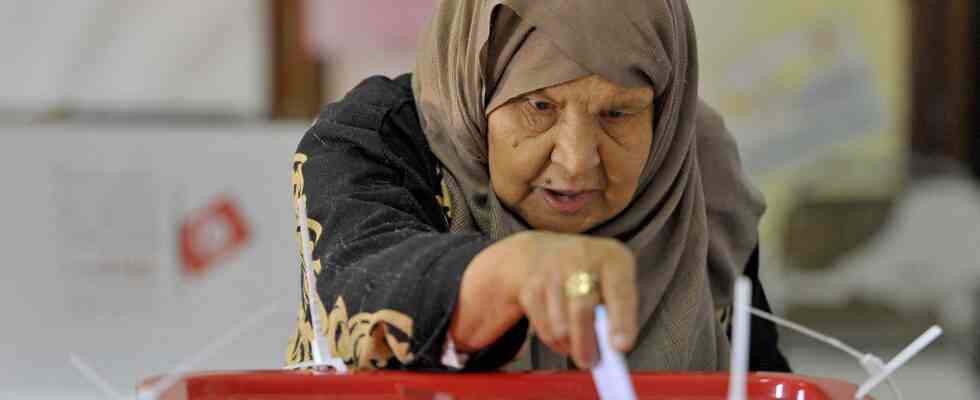Status: 17.12.2022 5:50 p.m
Gaping emptiness in the polling stations in Tunisia. After the opposition’s call for a boycott, many expected the turnout to be low. What else could be behind it?
Bright sunshine over the medina of Tunis. It was already bustling in the old town on election morning. Sellers have already unpacked their ceramic handicrafts, leather bags, souvenirs and all sorts of cheap goods from Asia and are courting potential buyers. In the city’s polling stations, on the other hand: a yawning lesson. It was mainly journalists who frolic here looking for eligible voters.
Every single voter was photographed, filmed and questioned umpteen times. Voters, however, were in short supply. At a polling station in downtown Tunis, people queued outside for the first parliamentary elections after the revolution.
hope for change
This time, reporters waited a long time for someone new to even enter the polling station, betting among themselves on how low the turnout would end up being. Some voters turned up after all, even though there was only one candidate in their polling station. One woman said: “Hopefully the country will be reformed. We are counting on our president, we are following him. God willing, Tunisia will be successful and the situation will improve. The lobbies have destroyed the economy, not the state. The speculation is fault.”
Another woman complained: “The cost of living, everything has become so expensive. Unemployment. There is so much. Hopefully the new ones are better.”
Individual candidates are competing for the first time
Many expected turnout to be low. After all, most major parties called for a boycott. A novelty in this election: there were no more party lists, but for the first time individual candidates. President Kais Saied has been criticized for wanting to weaken parliament and the separation of powers with his new constitution.
Interest was also low in other towns such as Sidi Bouzid. Actually, December 17 is a historic day, especially for the people in the country: in 2010, the greengrocer Mohamed Bouazizi burned himself out of desperation because of his economic situation and the arbitrary police in the country. He thus triggered mass protests and the revolution. But the people in Sidi Bouzid are less keen on talking about politics and candidates – this year you don’t really know who wants to be elected anyway.
President Saied has been criticized for wanting to weaken parliament and the separation of powers.
Image: AP
Critical voices in the town of Sidi Bouzid
A man from Sidi Bouzid said: “The elections? Of course I will take part, but only for the sake of form. I have no hope in the new candidates. We have lost hope in what they call state and government.” He could not have imagined that one day she would have to stand in line for flour, sugar or oil. “I have a son who is now telling me he wants to take the boat over there. Do I have some thousands to pay for it? If I had it, I would do it.”
Another man adds:
The people only want bread. People cry bitter tears after Ben Ali.
Migration as a big problem
Back to the times under ex-dictator Ben Ali – that was indeed often heard from the people of Tunisia. There also seemed little interest in the election in the coastal town of Sfax, two hours from Sidi Bouzid. Sfax is less than 200 kilometers from the Italian island of Lampedusa and is known for young Tunisians who do “harga” – illegal migration.
Only a few young people could be seen strolling through the old town – many would have run away, according to the city dwellers. On one of the many fishing boats that go out every day. “The Harga, the migration, is an essential part of our country. It’s not new, the people know what they’re getting into,” says a woman from Sfax. You have tried it yourself and will do it again. “Because there is no reason to stay in this country. No future, no money, no work, no level. Only illness, poverty, no education, garbage,” she explains.
Many unknown candidates
More than 1,000 individual candidates stood for the 161 seats in Parliament – but not all constituencies had multiple candidates. In some only one or even none at all. According to the first projections, it will be difficult for reporters to even analyze what the new Tunisian parliament will look like because many candidates are unknown.
President Saied had announced that Tunisia should become more grass-roots democratic. His critics accuse him of wanting to use the election to gain legitimacy after he has ruled by decree for the past year and a half. And the rest of Tunisia? The parliamentary elections just don’t seem to matter to them.
Parliamentary elections in Tunisia – and nobody goes?
Dunja Sadaqi, ARD Rabat, 17.12.2022 4:51 p.m

